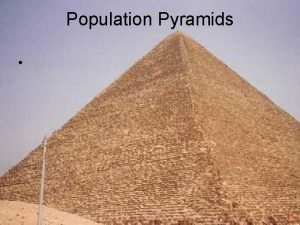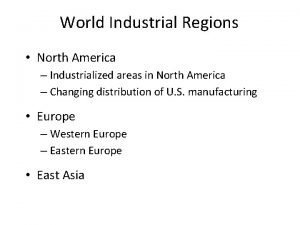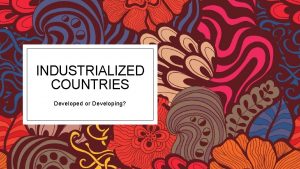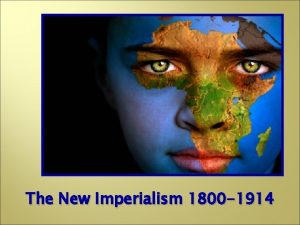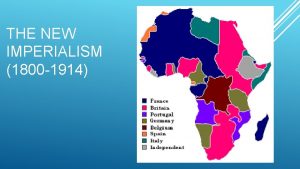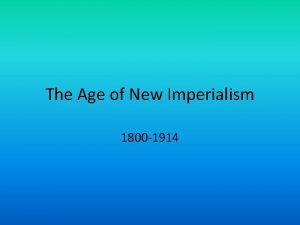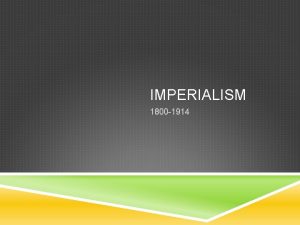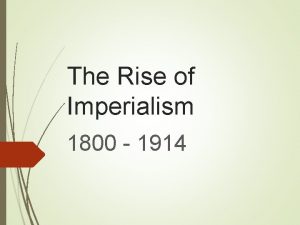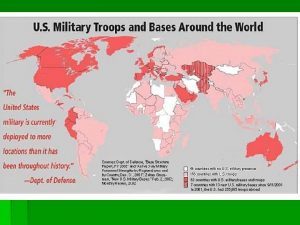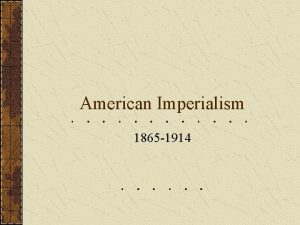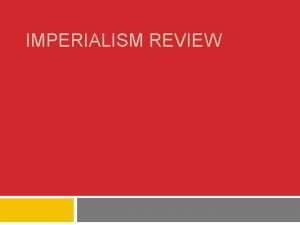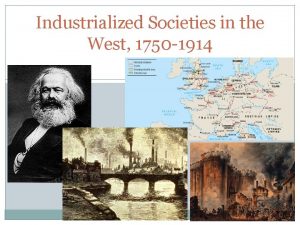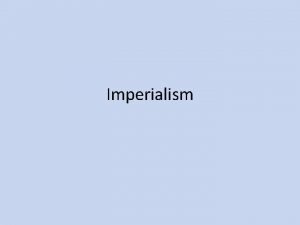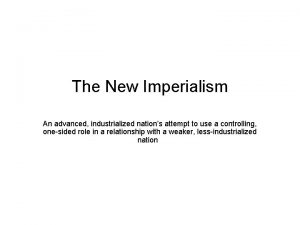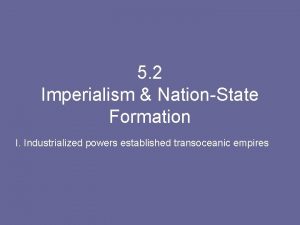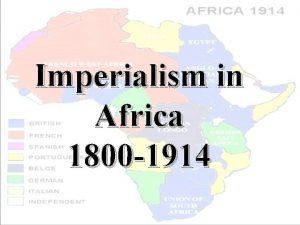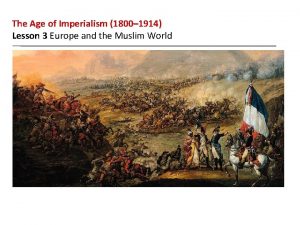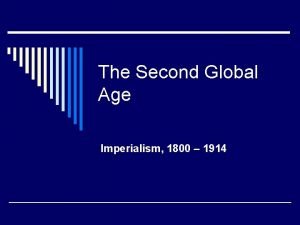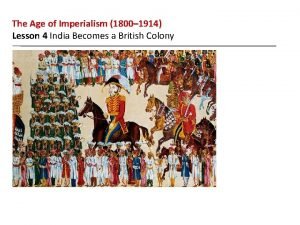Imperialism 1800 1914 Imperialism 1800 1914 The industrialized



















- Slides: 19

Imperialism 1800 -1914

Imperialism (1800 -1914) • The industrialized nations embarked upon a competition for overseas empires that had profound implications for the entire world. • embark- to make a start • empire- a major political unit having a territory of great extent or a number of territories or peoples under a single sovereign authority • profound- having intellectual depth and insight • implications- (implicate) to involve in the nature or operation of something

• Imperialism (1800 -1914) • This “new imperialism” focused on the underdeveloped world and led to the domination and exploitation of Asia, Africa and Latin America. • new imperialism- A time period of intense and stressed imperial expansion (when one empire looks outside its standing boundaries to colonize and engulf new regions in to its growing empire) • underdeveloped- having a relatively low economic level of industrial production and standard of living (as from lack of capital) • domination- supremacy or preeminence over another • exploitation- to make use of meanly or unfairly for one's own advantage


Content Statement #10 • Imperial expansion had political, economic and social roots. • • By the early 20 th century, many European nations as well as Japan extended their control over other lands and created empires. Their motivations had economic, political and social roots.

Roots of Imperialism • Political • desire to appear most powerful • bolster nationalistic pride • provide security through the building of military bases overseas

Roots of Imperialism • Economic • tied to production and consumption of goods • was a need for new markets, raw materials and outlets for population growth

Roots of Imperialism • Social • included the vision of some that it was “the white man’s burden” to civilize those perceived as uncivilized • Rudyard Kipling, The White Man's Burden, 1899 • also were humanitarian concerns and religious motivations

• Japanese Expansion • • Japanese leaders wanted to exert the power of Japan and confront Western imperialism by engaging in imperialist actions. Japan used its military might to establish footholds in Taiwan, China and Korea. • exert- to use (influence, authority, etc. ) forcefully or effectively • engage- To draw into; involve • foothold- A firm or secure position that provides a base for further advancement

• Meiji Restoration/ Meiji Era (1868 -1912) • Fill in the following chart with characteristics of the new Meiji government after reading Japanese Responses to Imperialism (pages 484 -485) in your textbook. You should be able to identify three points for each heading. Social Changes system of social classes was abolished all Japanese became free to choose their occupations universal compulsory education was established Political Changes Economic Changes government centralized enacted government was commercial policy established to encourage constitution was private investment accepted government built national modern methods assembly was of transportation formed, of which and one house was communication elected Japan industrialized

• Sino-Japanese War (1894 -1895) • • • Conflict between Japan and China that marked the emergence of Japan as a major world power and demonstrated the weakness of the Chinese empire The war grew out of conflict between the two countries for supremacy in Korea Sino-Japanese video The Chinese battleship Zhenyuan captured by the Japanese during the Sino-Japanese War, 1895.

• Russo-Japanese War (1904 -1905) • • • War between Russia and Japan fought in Korea & Manchuria Russia's defeat kept it from expanding farther east • Also encouraged the anti-czarist movements that led to the Russian revolution of 1905 and the Communist revolution of 1917 Japan won new territory and emerged as a world power This showed the world that a nonwhite country could defeat Europeans encouraged the rise of Asian and African nationalism that eventually led to the breakup of the European colonial empires. Conflict in the Far East Video Clip

• Content Statement #11 • Imperialism involved land acquisition (gaining land), extraction (taking) of raw materials, spread of Western values and maintenance of (keeping) political control. • • In the late 19 th and early 20 th centuries, European countries competed to establish colonies in Africa and Asia. Raw materials needed for their growing industries were extracted from the colonies.

• Western Values • Imperialism resulted in the spread of Western values: • Religion-Christianity • Customs- practices followed by people of a particular group or region • Ways of governingdemocratic

• Direct Control • • Some European powers (e. g. , France, Belgium) preferred direct control over the colonies they established during this period. A pattern of paternalism reflected a European belief that Africans should be governed by the European colonizers and protected like children. • Paternalism-A policy or practice of treating or governing people in a fatherly manner, especially by providing for their needs without giving them rights or responsibilities

• Indirect Control • • Some European powers (e. g. , Great Britain, the Netherlands) preferred indirect control over their colonies, using local systems of authority. They felt that working with the local native leaders would: • lessen the possibility of revolts • encourage the colonized to assimilate western traditions • culture • governing

• Imperialism in China • European powers used spheres of influence to establish economic control in China. • a spatial region or conceptual division over which a state or organization has significant cultural, economic, military, or political influence • Western nations were guaranteed specific trading privileges to each nation within its respective sphere

• Open Door Policy Eventually the United States demanded equal trading status within China, and rather than carve out its own sphere of influence, simply announced the Open Door Policy in 1899 • stated that all nations should have equal trading rights regardless of spheres of influence. • China should be open to all nations that wish to trade with them In this French cartoon, Britain, Germany, Russia, France, and Japan carve up China. • this policy did not include the consent of the Chinese, and was another form of imperialism •

• Content Statement #12 • The consequences of imperialism were viewed differently by the colonizers and the colonized. • • Dramatic differences in viewpoints existed between the European colonizers and those they colonized. Different viewpoints between these two groups included: • the extension of Western cultural practices vs. loss of traditions • modernization vs. breakup of past institutions
 Imperialism map 1914
Imperialism map 1914 Brain gain definition ap human geography
Brain gain definition ap human geography Newly industrialized countries
Newly industrialized countries Newly industrialized country population pyramid
Newly industrialized country population pyramid Modular man camps
Modular man camps Industrial region in north america
Industrial region in north america Newly industrialized population pyramid
Newly industrialized population pyramid Old imperialism examples
Old imperialism examples Africa 1890
Africa 1890 Thơ thất ngôn tứ tuyệt đường luật
Thơ thất ngôn tứ tuyệt đường luật Các châu lục và đại dương trên thế giới
Các châu lục và đại dương trên thế giới Từ ngữ thể hiện lòng nhân hậu
Từ ngữ thể hiện lòng nhân hậu Diễn thế sinh thái là
Diễn thế sinh thái là Vẽ hình chiếu vuông góc của vật thể sau
Vẽ hình chiếu vuông góc của vật thể sau Thế nào là giọng cùng tên
Thế nào là giọng cùng tên 101012 bằng
101012 bằng Alleluia hat len nguoi oi
Alleluia hat len nguoi oi Tỉ lệ cơ thể trẻ em
Tỉ lệ cơ thể trẻ em Lời thề hippocrates
Lời thề hippocrates Hổ đẻ mỗi lứa mấy con
Hổ đẻ mỗi lứa mấy con



